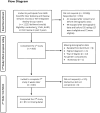An experimental study of simulated grant peer review: Gender differences and psychometric characteristics of proposal scores
- PMID: 39689098
- PMCID: PMC11651561
- DOI: 10.1371/journal.pone.0315567
An experimental study of simulated grant peer review: Gender differences and psychometric characteristics of proposal scores
Abstract
Peer review is a decisive factor in selecting research grant proposals for funding. The usefulness of peer review depends in part on the agreement of multiple reviewers' judgments of the same proposal, and on each reviewer's consistency in judging proposals. Peer reviewers are also instructed to disregard characteristics that are not among the evaluation criteria. However, for example, the gender identity-of the investigator or reviewer-may be associated with differing evaluations. This experiment sought to characterize the psychometric properties of peer review among 605 experienced peer reviewers and to examine possible differences in peer review judgments based on peer reviewer and investigator gender. Participants evaluated National Institutes of Health-style primary reviewers' overall impact statements that summarized the study's purpose, its overall evaluation, and its strengths and weaknesses in five criterion areas: significance, approach, investigator, innovation, and environment. Evaluations were generally consistent between reviewers and within reviewers over a two-week period. However, there was less consistency in judging proposals with weaknesses. Regarding gender differences, women reviewers tended to provide more positive evaluations, and women investigators received better overall evaluations. Unsuccessful grant applicants use reviewer feedback to improve their proposals, which could be made more challenging with inconsistent reviews. Peer reviewer training and calibration could increase reviewer consistency, which is especially relevant for proposals with weaknesses according to this study's results. Evidence of systematic differences in proposal scores based on investigator and reviewer gender may also indicate the usefulness of calibration and training. For example, peer reviewers could score practice proposals and discuss differences prior to independently scoring assigned proposals.
Copyright: This is an open access article, free of all copyright, and may be freely reproduced, distributed, transmitted, modified, built upon, or otherwise used by anyone for any lawful purpose. The work is made available under the Creative Commons CC0 public domain dedication.
Conflict of interest statement
The authors have declared that no competing interests exist.
Figures
Similar articles
-
Peer review: Risk and risk tolerance.PLoS One. 2022 Aug 26;17(8):e0273813. doi: 10.1371/journal.pone.0273813. eCollection 2022. PLoS One. 2022. PMID: 36026494 Free PMC article.
-
Panel discussion does not improve reliability of peer review for medical research grant proposals.J Clin Epidemiol. 2012 Jan;65(1):47-52. doi: 10.1016/j.jclinepi.2011.05.001. Epub 2011 Aug 9. J Clin Epidemiol. 2012. PMID: 21831594
-
Peer review of grant applications: criteria used and qualitative study of reviewer practices.PLoS One. 2012;7(9):e46054. doi: 10.1371/journal.pone.0046054. Epub 2012 Sep 28. PLoS One. 2012. PMID: 23029386 Free PMC article.
-
A primer: peer review process for Advances in Physiology Education.Adv Physiol Educ. 2024 Dec 1;48(4):932-935. doi: 10.1152/advan.00127.2024. Epub 2024 Sep 5. Adv Physiol Educ. 2024. PMID: 39236106 Review.
-
Strategies to Prevent or Reduce Gender Bias in Peer Review of Research Grants: A Rapid Scoping Review.PLoS One. 2017 Jan 6;12(1):e0169718. doi: 10.1371/journal.pone.0169718. eCollection 2017. PLoS One. 2017. PMID: 28061509 Free PMC article.
References
-
- Erosheva EA, Martinková P, Lee CJ. When zero may not be zero: A cautionary note on the use of inter-rater reliability in evaluating grant peer review. J R Stat Soc Ser A Stat Soc. 2021;184(3):904–19.
-
- Reinhart M. Peer review of grant applications in biology and medicine. Reliability, fairness, and validity. Scientometrics. 2009;81(3):789–809.
-
- Jerrim J, Vries R. Are peer reviews of grant proposals reliable? An analysis of Economic and Social Research Council (ESRC) funding applications. Soc Sci J. 2023;60(1):91–109.
MeSH terms
LinkOut - more resources
Full Text Sources


